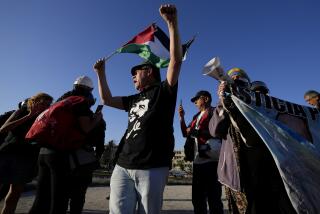Poles Reject Reforms in an Upset for Regime
WARSAW â Polandâs government, in a shocking defeat, lost a referendum on political and economic reforms that would have sent prices for food and other basics skyrocketing, the regime announced today.
For the first time in a national poll in communist Eastern Europe, voters rejected the authoritiesâ program and effectively declared a vote of no confidence.
The double defeat is a stunning blow to the government of Polish leader Gen. Wojciech Jaruzelski, which strongly campaigned for the two measures in Sundayâs plebiscite.
Foreign Minister Marian Orzechowski told ambassadors at a special lunchtime meeting that the first referendum question, on economic proposals, gained only 44% support from eligible voters, the diplomatic sources said.
The second question, referring to political concessions, won 46% approval.
The authorities had said the results would be binding.
Only 68% Cast Ballots
The results of the referendum, which the opposition had dismissed as a pointless propaganda exercise, had been expected to produce support for the governmentâs reform drive.
Government spokesman Jerzy Urban told reporters early today that only 68% of Polandâs 26 million eligible voters cast ballots.
Poles were asked to approve radical reforms to make Polandâs sluggish, debt-plagued economy more market-oriented, and promising prosperity after two or three years of austerity.
They were also asked if they favor a âPolish model of democratization,â that would likely include giving more power to local governments and opening up high-level positions to people who do not belong to the Communist Party.
Solidarity leaders, though advising people not to vote, did not wage an active boycott campaign.
Contradicts Solidarity
At the news conference early today, Urban denied that a Solidarity statement advising voters to consider the referendum propaganda significantly held down voter turnout.
Fear of price increases and weariness with the difficulties of everyday life in Polandâs moribund economy had a greater effect in discouraging voters, he said.
He said he thought publication of a policy on prices and income on the eve of the referendum had influenced voter turnout. The proposals would double food prices next year and triple rent and heating costs.
Price rises have sparked riots in the past and led to the creation of the Solidarity free trade union, which was outlawed in 1981.
The authorities promised to balance price rises with higher salaries, but failed to provide details.
Social and political changes offered in the second part of the ballot were widely seen as a concession for austerity, and because they were not clearly defined or endorsed beforehand by the Communist Party, many Poles felt they were voting in the dark.
Solidarity activist Jozef Pinior said by telephone today from Wroclaw that the results âwere influenced by the whole seven-year period since Solidarityâs emergence. In this period there has developed an independent opinion in Poland. . . . â
More to Read
Sign up for Essential California
The most important California stories and recommendations in your inbox every morning.
You may occasionally receive promotional content from the Los Angeles Times.










